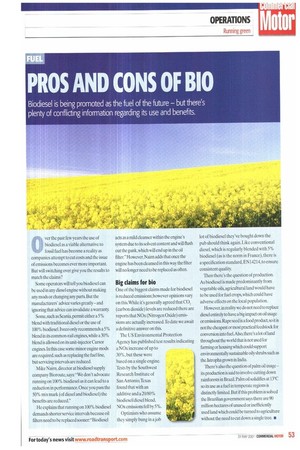PROS AND CONS OF BIO
Page 53

If you've noticed an error in this article please click here to report it so we can fix it.
Biodiesel is being promoted as the fuel of the future — but there's plenty of conflicting information regarding its use and benefits.
0ver the past few years the use of : biodiesel as a viable alternative to fossil fuel has become a reality as companies attempt to cut costs and the issue of emissions becomes ever more important. But will switching over give you the results to match the claims?
Some operators will tell you biodiesel can be used in any diesel engine without making any mods or changing any parts. But the manufacturers' advice varies greatly -and ignoring that advice can invalidate a warranty.
Some, such as Scania, permit either a 5% blend with traditional diesel or the use of 100% biodiesel. Iveco only recommends a 5% blend in its common-rail engines, while a 30% blend is allowed on its unit-injector Cursor engines. In this case some minor engine mods are required. such as replacing the fuel line, but servicing intervals are reduced.
Mike Nairn, director at biodiesel supply company Bioroute, says:"We don't advocate running on 100% biodiesel as it can lead to a reduction in performance. Once you pass the 50% mix mark (of diesel and biodiesel) the benefits are reduced."
He explains that running on 100% biodiesel demands shorter service intervals because oil filters need to be replaced sooner:"Biodiesel acts as a mild cleanser within the engine's system due to its solvent content and will flush out the gunk, which will end up in the oil filter." However, Nairn adds that once the engine has been cleansed in this way the filter will no longer need to be replaced as often, Big claims for bio One of the biggest claims made for biodiesel is reduced emissions; however opinions vary on this, While it's generally agreed that CO, (carbon dioxide) levels are reduced there are reports that NOx (Nitrogen Oxide) emissions are actually increased.To date we await a definitive answer on this.
The US Environmental Protection Agency has published test results indicating a NOx increase of up to 30%, but these were based on a single engine. Tests by the Southwest Research Institute of San Antonio,Texas found that with an additive and a 20/80% biodiesel/diesel blend, NOx emissions fell by 5 %.
Optimists who assume they simply bung in a job lot of biodiesel they've bought down the pub should think again. Like conventional diesel, which is regularly blended with 5% biodiesel (as is the norm in France), there is a specification standard, EN14214, to ensure consistent quality.
Then there's the question of production. As biodiesel is made predominantly from vegetable oils, agricultural land would have to be used for fuel crops, which could have adverse effects on the local population.
However, in reality we do not need to replace diesel entirely to have a big impact on oil usage or emissions Rape seed is a food product,so it is not the cheapest or most practical feedstock for conversion into fuel.Also,there's a lot of land throughout the world that is not used for farming or housing which could support environmentally sustainable oily shrubs such as the Jatropha grown in India.
There's also the question of palm oil usage its production is said to involve cutting down rainforests in Brazil. Palm oil solidifies at 13°C so its use as a fuel in temperate regions is distinctly limited. But if this problem is solved the Brazilian government says there are 90 million hectares of unused or inefficiently used land which could be turned to agriculture without the need to cut down a single tree. is






















































































































































































